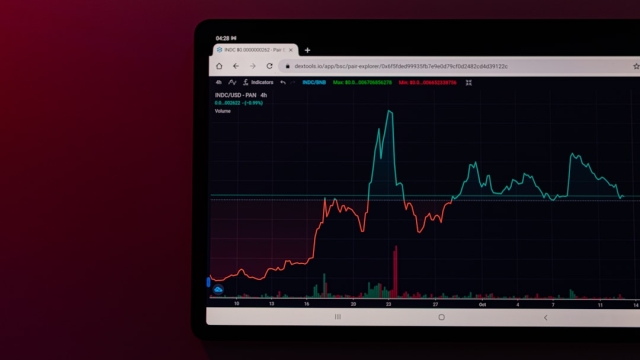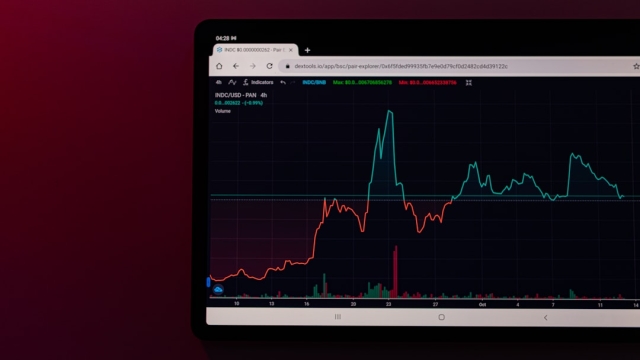The Future of Finance: Unraveling the Power of Blockchain and Cryptocurrency
Welcome to the future of finance, where revolutionary technologies like blockchain and cryptocurrency are transforming the landscape of traditional banking and opening up a world of endless possibilities. With the advent of Web3, we are witnessing a paradigm shift towards a more decentralized and transparent financial system. This article aims to explore the power of blockchain and cryptocurrency in unraveling the potential of Web3, as well as shed light on the emerging concept of Decentralized Finance (DeFi). So fasten your seatbelts as we delve into the fascinating realm of blockchain and cryptocurrency, where innovation knows no boundaries.
In the realm of blockchain, the technology underlying the digital currencies we know as cryptocurrencies, we discover a distributed ledger that holds the potential to revolutionize financial transactions. By allowing a network of computers to maintain a transparent record of transactions, blockchain eliminates the need for intermediaries, streamlines processes, and enhances security. The decentralized nature of blockchain technology ensures that no single entity has control over the data, promoting trust and further bolstering the authenticity of financial transactions. With its ability to provide immutable records, blockchain paves the way for a new era of trust and accountability in financial systems.
Enter cryptocurrency, the digital asset that has taken the world by storm. Powered by blockchain, cryptocurrencies such as Bitcoin and Ethereum have gained significant traction, enabling secure peer-to-peer transactions without the need for traditional financial institutions. These digital currencies are not bound by geographical borders or restrictions, offering greater accessibility and financial inclusion. As the demand for cryptocurrencies continues to surge, the market is witnessing the emergence of new altcoins with unique features and use cases, pushing the boundaries of what is possible in the realm of digital finance.
As we navigate through this exciting space, we cannot ignore the rise of Decentralized Finance, or DeFi, which aims to recreate traditional financial systems in a decentralized manner using blockchain technology. DeFi platforms offer a plethora of services typically provided by banks, such as lending, borrowing, and asset trading, but with the added benefit of greater accessibility, transparency, and efficiency. By removing the need for intermediaries and replacing them with smart contracts, DeFi empowers individuals by giving them full control over their assets and financial decisions. This disruptive force has the potential to reshape the way we think about traditional banking and democratize financial services for the masses.
In conclusion, the future of finance lies in the hands of blockchain and cryptocurrency, as they unlock new avenues for innovation and reshape the way we conduct financial transactions. With the advent of Web3 and the rise of DeFi, the potential for a decentralized and inclusive financial ecosystem is within reach. So, keep your eyes peeled as we dive deeper into the realm of blockchain and cryptocurrency, for the possibilities are endless and the future is now.
Web3: Transforming the Digital Landscape
Web3 technology has been heralded as a groundbreaking innovation in the digital realm, revolutionizing various industries and reshaping the way we interact with the online world. Built on the foundation of blockchain, Web3 offers a decentralized and transparent infrastructure that holds immense potential for transforming the future of finance.
One of the key elements of Web3 is its ability to enable peer-to-peer transactions through cryptocurrency. Cryptocurrencies like Bitcoin and Ethereum have gained significant traction, providing users with a decentralized digital currency that is not bound by the traditional limitations of centralized financial systems. With the rise of cryptocurrencies, Web3 has ushered in a new era of financial possibilities, challenging the status quo and paving the way for a more inclusive and accessible financial landscape.
Decentralized Finance (DeFi) is another transformative aspect of Web3 technology. By leveraging the power of smart contracts, DeFi platforms enable individuals to access a wide range of financial services without the need for intermediaries or central authorities. From decentralized lending and borrowing to automated trading and investing, DeFi protocols are reshaping the traditional financial infrastructure, offering greater efficiency, transparency, and accessibility to users around the globe.
Blockchain technology, the underlying framework of Web3, plays a crucial role in ensuring the security and immutability of transactions and data. Through its decentralized nature, blockchain provides a tamper-proof and transparent ledger that enables secure and efficient transactions. Blockchain’s potential extends beyond finance as well, with applications ranging from supply chain management to identity verification.
In conclusion, Web3 is revolutionizing the digital landscape, particularly in the realm of finance. With its decentralized nature, seamless integration of cryptocurrencies, and the advent of DeFi platforms, Web3 is poised to disrupt traditional financial systems and empower individuals with greater control over their financial destiny. The future of finance lies in the harnessing of Web3 technology, opening up new possibilities and reshaping the financial landscape as we know it.
The Rise of Decentralized Finance (DeFi)
Decentralized Finance, also known as DeFi, has emerged as a powerful force within the world of finance. Enabled by the revolutionary technology of blockchain, DeFi has the potential to transform traditional financial systems and reshape the way we interact with money.
At its core, DeFi eliminates the need for intermediaries such as banks or financial institutions by utilizing blockchain technology. This decentralization empowers individuals to have direct control over their finances, enabling them to transact, borrow, lend, and invest without the need for a trusted third party.
One of the key pillars of DeFi is the concept of Web3. With Web3, individuals have access to a borderless and permissionless financial ecosystem. This allows for the seamless integration of different decentralized applications (dApps), which can offer a wide range of financial services, including lending platforms, decentralized exchanges, and stablecoin protocols.
The rise of DeFi has also brought attention to the potential of blockchain technology. Blockchain, the immutable and transparent digital ledger, forms the foundation of DeFi applications. By leveraging blockchain, DeFi protocols can ensure security, transparency, and efficiency in financial transactions, paving the way for a more inclusive and accessible financial system.
As DeFi continues to gain momentum, it challenges the traditional financial landscape by offering innovative solutions that prioritize accessibility, security, and financial sovereignty. With the power of blockchain and cryptocurrency, DeFi represents a significant paradigm shift in finance, promising a future where individuals have more control over their financial lives, free from the constraints of centralized intermediaries.
Blockchain and Cryptocurrency: Shaping the Future of Finance
Empowering Web3 and Decentralised Finance
The emergence of blockchain technology and cryptocurrency has brought forth tremendous potential for reshaping the financial landscape. With the advent of Web3, a decentralized version of the internet, users have gained more control over their digital identities, assets, and transactions. Blockchain technology forms the underlying infrastructure, providing a secure and transparent platform that enables trustless peer-to-peer interactions. One of the most significant applications of blockchain lies in the realm of Decentralised Finance (DeFi), where traditional financial services are recreated in a decentralized manner, offering increased accessibility and inclusivity.

Unleashing the Potential of Blockchain
Blockchain technology’s innovative characteristics are transforming various sectors, particularly finance. By utilizing distributed ledgers, blockchain removes the need for intermediaries, such as banks, for conducting transactions. This decentralization ensures that transactions are verified and recorded accurately, eliminating the possibility of fraudulent activities. Furthermore, blockchain’s immutability guarantees the security and integrity of financial data, leading to increased trust among participants. As blockchain continues to evolve and garner widespread adoption, it has the potential to expedite transaction speed, reduce costs, and improve the overall efficiency of financial systems.
The Rise of Cryptocurrency
Cryptocurrency, the digital form of currency enabled by blockchain technology, has brought about a paradigm shift in the way we perceive and use money. Operating independently of centralized authorities, cryptocurrencies enable peer-to-peer transactions that are transparent and resistant to censorship. With the increasing acceptance of cryptocurrencies as a medium of exchange, we are witnessing a fundamental transformation in the financial landscape. Cryptocurrencies have the potential to provide financial services to the unbanked and underbanked populations, fostering financial inclusion and empowering individuals with more control over their money. Moreover, the programmable nature of some cryptocurrencies enables the creation of innovative financial instruments and smart contracts, revolutionizing traditional financial processes.
In conclusion, blockchain and cryptocurrency are propelling the future of finance by ushering in a new era of decentralized and transparent financial systems. With Web3 and its associated technologies gaining momentum, barriers to financial access and intermediaries are being broken down. As blockchain technology continues to evolve and cryptocurrencies become more widely accepted, the financial landscape will witness significant disruption and innovation in the years to come.


